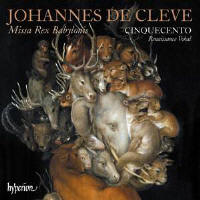Reviewer: William
J. Gatens
Little is known of the early
life of Johannes de Cleve (1528-82). In 1553 his first published
compositions appeared in Antwerp, and in the same year he was appointed as a
tenor in the chapel of King (from 1556 Emperor) Ferdinand I in Vienna. The
rest of Cleve's career was spent in the service of the House of Hapsburg. In
1559 he dedicated two collections of motets to the emperor. After
Ferdinand's death in 1564, Cleve took a position in Graz at the court of the
emperor's youngest son, Archduke Karl. In 1570 he asked to be relieved of
active duties at court for reasons of physical incapacity. This and a
pension were granted on the condition that he continue furnishing the court
with compositions. He moved first to Vienna and finally to Augsburg, where
he published one of his most celebrated collections, Cantiones seu
Harmoniae Sacrae, in 1579. It contains several "state motets" including
epitaphs for Ferdinand I, Maximilian II, and (recorded here) Karl Friedrich
of Jülich Cleves Berg, who died at the age of 19 in 1575 of smallpox while
in Rome. The opening motet of the collection, and of the present recording,
'Carole qui Veniens', is in praise of the composer's patron, Archduke Karl.
The principal work on the program, Cleve's Mass Rex Babylonis,
published in 1568, is a parody mass based on the motet by Jacobus Vaet
(c1529 1567). The two composers would have been colleagues in Vienna. A
performance of Vaet's motet concludes the present program. As Grantley
McDonald points out in his notes to this recording, Cleve's mass is not
merely a cut and paste of the motet, but a sophisticated development and
reinterpretation of the motet's thematic and contrapuntal ingredients. Both
Cleve and Vaet represent an extension of the Netherlands school into the
late 16th Century. Among the traits they inherit from the generation of
Nicolas Gombert and Jacobus Clemens non Papa is a partiality for full
textures. Once the voices have entered, there are very few rests. All of the
voices are singing nearly all of the time. There are not very many moments
that could be described as arresting: some syncopations in the Osanna and a
cross relation in the Agnus Dei, but these are not typical. McDonald's
analytical observations bring out the sophistication and ingenuity of
Cleve's part writing and some affinities with the styles of Palestrina and
Lassus, but I suspect most listeners are more likely to be taken by the
frictionless flow of the counterpoint. Formed in Vienna in 2004, Cinquecento
is an ensemble of five male singers from five European countries (Austria,
Belgium, England, Germany, and Switzerland) who specialize in lesser known
16th Century choral works from the courts of imperial Austria, though they
are by no means limited to that repertory. As heard here, they are a
perfectly blended vocal consort performing with an excellent sense of phrase
and nuance without the imposition of exaggerated dynamic shadings. The
recorded sound is warm and clear. The Hyperion engineers demonstrate again
and again that they really do know how to
record vocal ensembles.
The booklet contains
advertisements for 11 other recordings by them.
Fermer la fenêtre/Close window
|




